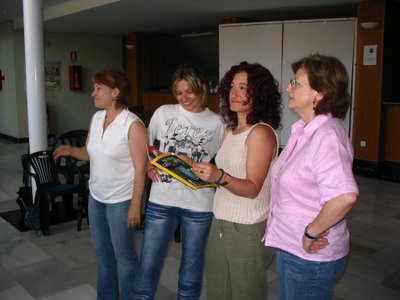Monday, May 22, 2006
Summary of the "English through Drama" Workshop



Well Saturday turned out to be a really good day. The group who chose to do "English through Drama" were the perfect size (10) and prepared to have fun and try anything - great people to work with. This is a very brief summary of what we did:
a) Quick overview of the workshop and talk about objective: to produce a short improvised play to be acted out to the other conference participants in the afternoon.
b) Group mingling activities - we established everyone's names and where they lived through ordering exercises
c) Voice warm-up: we produced two sustained notes a 5th apart and then spread out to the farthest limits of the hall. (At this point some may have wondered if they had come to the right workshop).
d) Physical warm-up: a group mirroring activity, followed by the same activity in pairs
e) Mime - Hotel Reception. This competitive team activity involved miming requests or complaints, word by word, in a hotel context. Some very skillful mime artists surfaced.
f) More mime - ways of moving and walking. Working in pairs A had to guess what was written on B's card by observing how he/she moved.
g) Mime with music: the idea here was to introduce the notion of mood, provided by a very varied range of musical clips. In pairs we mimed cleaning the house and making pancakes to music ranging from Liszt to Al Green. Some very comic moments at this point - especially when Joa and Nadia's cooking turned into a fight, hitting each other over the head with imaginary saucepans to the sounds of Joey Ramone's "What a Wonderful World"! An interesting discussion followed: was it better to start the pair mime with a basic idea in mind or to let things happen spontaneously through interaction with the partner and in keeping with the mood of the music? My own feeling is that although the second of these approaches can feel a little insecure at first, the results tend to be more unpredictable and more interesting.
h) Sculpting: working with photos mainly from National Geographic one half of the class "sculpted" the other into various group poses, first using only their hands and then using only verbal instructions and no hands. After each sculpting, the "statues" had to say what they thought their group pose was. This is the activity that can be seen in the photos at the top of this post. Luis and Manuel thought they were part of a horror film (look at the great expression on Luis' face), but in fact they were Zambian Makishi dancers performing rites to honour the spirits of the village's ancestors. The second photo is of a group posing as an advertisement for Bombay Gin and the third is of the sculptresses admiring their work.
i) Improvisation warm-up: One line improvisations. Working in pairs, A reads out the first line of a dialogue (from a card), the rest of which has to be improvised with B. Some interesting negotiation of meaning takes place when A and B are not necessarily on the same wavelength initially.
j) Group improvisation: the final part of the workshop arrived all too soon. As a group we briefly discuss what situation the improvisation should be based on and agree on a wedding. We agreed that an incident was needed to develop the situation and decided that this should be that the bride had changed her mind. Improvising the scene a number of times we eventually decided that the change of heart was because she had a lesbian lover who turned out to be having an affair with the groom as well. (This is the kind of thing that frequently happens in Venezuelan soap operas, but it's not so often you come across it in a language classroom).
Later, in the afternoon, we performed our short play to the other conference participants, and although it came out different each time (this is the nature of group improvisation), some felt that it had turned out best the last time. The nervousness of performing in front of an audience sharpens the reactions and brings out the drama in all of us. So, in conclusion, a very brief and enjoyable taste of the excitement of group improvisation - I hope everyone enjoyed the workshop as much as I did.
XI Jornades de Didàctica de la Dramatització - English through Drama
I transferred this from a previous blog which is why the date of posting is later than the event the post announced, sort of like back to the future. (I will soon be in control of this technology).
On Saturday 20th May, from 9.30 a.m. onwards, the CEFIRE are hosting “XI Jornades de Didàctica de la Dramatització” in La Eliana. Further information can be found at:
http://ambitlinguistic.blogspot.com/
I will be running a workshop there entitled “English through Drama”. The workshop will be all in English, but it’s not only for English teachers - if you can understand this, you’ll definitely understand what’s happening in the workshop, so come and join us.
Why are drama activities useful for students studying a language? There are many good answers to this question, but perhaps the most important are:
1) Drama activities get students to use their skills and language knowledge in an integrated way, unlike for example grammar activities which often use only one or two structures at a time (something we never do in real life).
2) Drama activities put language use in a real context, one that students can identify with, or find interesting, or funny. This has a strong impact on their motivation to learn.
3) Giving students a role provides them with a mask, and this helps different students in different ways. Shy students feel less threatened as it is not all about them but about their assumed persona. Confident students have an opportunity to shine - the opportunities for humour are many. Weak students can draw on non-language skills in order to communicate successfully, for example with gesture, facial expressions, mime etc…
4) Although in a school situation what generally matters is the syllabus and its assessment, drama activities send students the message that in life outside school what counts most is successful and effective communication, and all the strategies that go with that objective. The British Airways stewardess doesn’t really care if you wrongly used the simple past instead of the present perfect.
5) Drama activities are fun and fun is motivating, as long as it is controlled and students understand that there is a meaningful purpose behind it.
We will do a range of drama activities - including mime, roleplay and improvisation - and see firsthand what the above statements mean in practice. At the end you will have a number of activities, approaches and ideas that can be successfully transferred to most students and most ages. Come!
On Saturday 20th May, from 9.30 a.m. onwards, the CEFIRE are hosting “XI Jornades de Didàctica de la Dramatització” in La Eliana. Further information can be found at:
http://ambitlinguistic.blogspot.com/
I will be running a workshop there entitled “English through Drama”. The workshop will be all in English, but it’s not only for English teachers - if you can understand this, you’ll definitely understand what’s happening in the workshop, so come and join us.
Why are drama activities useful for students studying a language? There are many good answers to this question, but perhaps the most important are:
1) Drama activities get students to use their skills and language knowledge in an integrated way, unlike for example grammar activities which often use only one or two structures at a time (something we never do in real life).
2) Drama activities put language use in a real context, one that students can identify with, or find interesting, or funny. This has a strong impact on their motivation to learn.
3) Giving students a role provides them with a mask, and this helps different students in different ways. Shy students feel less threatened as it is not all about them but about their assumed persona. Confident students have an opportunity to shine - the opportunities for humour are many. Weak students can draw on non-language skills in order to communicate successfully, for example with gesture, facial expressions, mime etc…
4) Although in a school situation what generally matters is the syllabus and its assessment, drama activities send students the message that in life outside school what counts most is successful and effective communication, and all the strategies that go with that objective. The British Airways stewardess doesn’t really care if you wrongly used the simple past instead of the present perfect.
5) Drama activities are fun and fun is motivating, as long as it is controlled and students understand that there is a meaningful purpose behind it.
We will do a range of drama activities - including mime, roleplay and improvisation - and see firsthand what the above statements mean in practice. At the end you will have a number of activities, approaches and ideas that can be successfully transferred to most students and most ages. Come!
